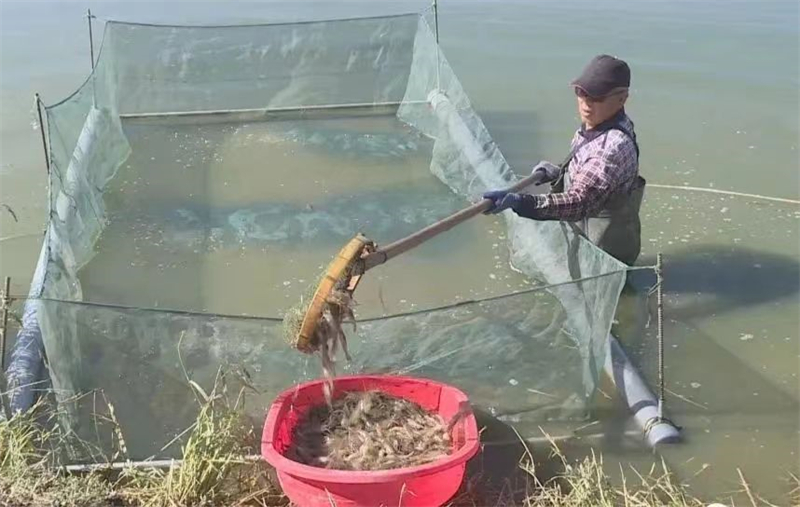Aquaculture thrives on edge of Tengger Desert in NW China's Gansu
Jingtai county in Baiyin city, northwest China's Gansu Province is located on the southern edge of the Tengger Desert. It has a significant evaporation rate and 163,000 mu (10,867 hectares) of moderate to severe saline and alkaline land.
In 2016, Jingtai county implemented the innovative idea of using aquaculture to address the issue of saline and alkaline land while also boosting industrial development.

A worker harvests shrimps in Jingtai county, northwest China's Gansu Province. [Photo/Media convergence center of Jingtai county]
Local fishery enterprises proactively embarked on a journey to unlock the potential of saline and alkaline land. They conducted water quality testing and variety trials, and successfully cultivated shrimps and fish using saline and alkaline water.
Zhou Jincheng, the head of the Jincheng Agricultural Technology Development Co., Ltd. which specializes in white-leg shrimps farming, said the government's provision of equipment for extracting saline and alkaline water eliminates the need for the company to invest in this resource.
In addition, the company has transformed abandoned land into a productive cultivation area. The previously unproductive saline and alkaline land now generates an annual income of 10,000 yuan ($1,393) per mu.
Jingtai county actively attracts investment and expands the industrial chain. To support aquaculture, the local government provides subsidies based on the conditions of fish ponds, as well as technical, pharmaceutical, transportation, and facility support.
Fish farming not only benefits companies but also helps local villagers increase their income and employment opportunities. Furthermore, the extraction of underground saline and alkaline water has continuously reduced salinization in the surrounding land.
The wastewater generated by aquaculture is also used for agricultural irrigation, gradually restoring the surrounding agriculture and creating a positive cycle of saline and alkaline water utilization.
Wang Tao, deputy county mayor of Jingtai, explained that after years of development, the county has established a distinctive fishery industry system. As of the beginning of 2024, Jingtai county had treated and utilized 20,000 mu of saline and alkaline land for fish farming.
In 2023, the fishery production of the county reached 2.12 million kilograms, with an output value exceeding 60 million yuan.
























